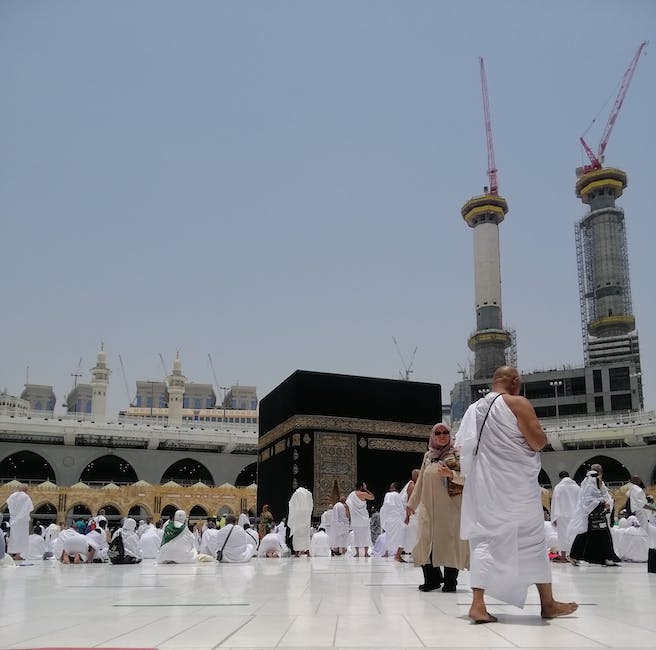Common Misconceptions About the Five Pillars of Islam
When people think about Islam, the Five Pillars are often the first thing that comes to mind. However, these pillars are much more than just a set of religious rituals to be checked off once a year. Each of the Five Pillars holds a unique and important significance in the practice of Islam.
The first pillar is Shahada, which is the declaration of faith in Allah and the Prophet Muhammad. This pledge is the very foundation upon which Islam is built, and it reflects the oneness of God and the acceptance of the guidance brought by Prophet Muhammad. It is not merely a verbal statement, but a heartfelt acceptance of God in one’s life.
The second pillar is Salat, also known as prayer. Prayer is the means by which Muslims connect with Allah on a daily basis, five times a day. By taking the time to perform this ritualistic prayer, Muslims are reminded of their faith and their connection to their Creator. It also fosters a sense of togetherness and community spirit as Muslims gather in the mosque to pray.
The third pillar is Zakat, which is often misunderstood as charity. While giving to charity is certainly virtuous in Islam, Zakat is not just optional giving. Rather, it is a mandatory duty for those who have reached a certain threshold of wealth. The act of giving Zakat is seen as a purification of one’s wealth and a reminder of the importance of helping those in need.
The fourth pillar is Sawm, or fasting during the month of Ramadan. It is a physical and spiritual act of worship, teaching Muslims self-restraint and dedication to their faith. Through fasting, Muslims learn to appreciate the blessings of food, water, and shelter, while also feeling a sense of empathy for those who are less fortunate.
The fifth and final pillar is Hajj, the pilgrimage to the holy city of Mecca. Hajj is a highly significant ritual that underscores the unity of the Muslim community worldwide, as millions of believers gather to perform the rites. It is a time for reflection, repentance and spiritual rebirth, and a chance to deepen one’s personal relationship with Allah.
In conclusion, the Five Pillars of Islam are not just merely rituals, but they serve as a means by which Muslims experience and express their faith in their day-to-day lives.

Fasting is not just about abstaining from food
Fasting is one of the Five Pillars of Islam that teaches Muslims self-discipline and self-control, and it is much more than just abstaining from food and drink during Ramadan. Fasting also includes refraining from certain activities, including sexual intercourse, smoking, and immoral thoughts and actions. By abstaining from these actions, Muslims can focus on purifying their hearts and minds, and gaining a deeper spiritual connection with Allah.
Fasting during Ramadan is also a time of deep reflection, increased prayer, and acts of generosity and charity. It is believed that during Ramadan, the gates of heaven are open and the gates of hell are closed, making it an ideal time to seek forgiveness, do good deeds and purify one’s soul. Fasting is therefore both a personal and communal act, bringing Muslims together in worship and shared experience.

Hajj is not just a pilgrimage; it has historical significance
Hajj, the pilgrimage to Mecca, is one of the most significant acts of worship in Islam and is a mandatory rite for all able-bodied and financially able Muslims who can afford to make the journey. While the focus of Hajj is the Kaaba, which Muslims believe to be the first house of worship built for Allah, the pilgrimage has a much broader significance and historical context.
Hajj commemorates the life and example of Prophet Ibrahim (Abraham), who built the Kaaba and who Muslims regard as one of the most important prophets in Islam. The rites performed during Hajj, such as the Tawaf (circumambulation of the Kaaba), symbolize the unity and equality of humanity before Allah, and the Sa’y, the running between the hills of Safa and Marwa, commemorates the story of Hajar (Hagar) and her search for water in the desert.
Hajj is also a time for Muslims to confront their mortality and renew their commitment to Allah. It is a powerful reminder that all of humanity will one day stand before Allah for judgment, and that it is incumbent upon us to live our lives with purpose and piety.
In conclusion, fasting teaches us self-control and helps us purify our hearts, while Hajj commemorates the life and example of Prophet Ibrahim and reminds us of our duty to Allah. Together, these two pillars form an integral part of Muslim practice and emphasize the importance of personal and communal worship.
Shahada is not just a phrase; it has a deep meaning
Shahada is the declaration of faith in Allah and the Prophet Muhammad, and it is considered the most important of the Five Pillars of Islam. The phrase “La ilaha illa Allah, Muhammadun rasulu Allah” (There is no god but Allah, and Muhammad is His messenger) is recited by Muslims in their daily prayers and is printed on flags, buildings, and other Islamic symbols.
While the phrase may seem simple, its meaning is profound and reflects the core belief of Islam. It is a declaration of monotheism, a rejection of polytheism, and an acceptance of the Prophethood of Muhammad. It affirms the belief in the oneness of God and the finality of His message through His Prophet, Muhammad.
The Five Pillars cannot be practiced alone; they require community involvement
It is important to note that the Five Pillars of Islam cannot be practiced alone, as they require community involvement and participation. Salat, for example, is often performed in congregation, and the Friday prayer (Jummah) is a communal obligation. Zakat is a form of obligatory charity that is distributed to those in need, strengthening the bonds of community and fostering a sense of social responsibility.
Fasting during Ramadan also emphasizes the importance of community, as families and friends gather together for iftar (breaking fast) and suhoor (pre-dawn meal). The Hajj pilgrimage brings together millions of Muslims from around the world in a powerful display of unity, faith, and devotion.
Even the Shahada, the declaration of faith, is often recited in the presence of witnesses, strengthening the individual’s commitment to their faith and the communal ties that exist within the Muslim community.
In conclusion, the Five Pillars of Islam are not just individual acts of worship but also have a community dimension that underscores the importance of social responsibility and togetherness. By practicing the Five Pillars together, Muslims build strong bonds of brotherhood and sisterhood, strengthen their faith, and enrich their spiritual lives.







